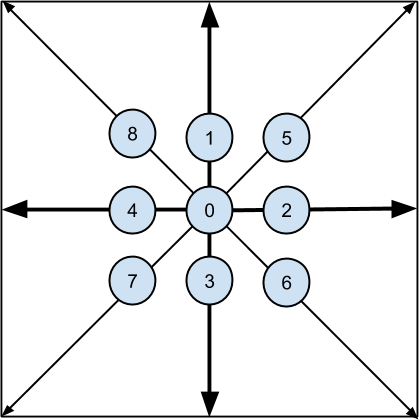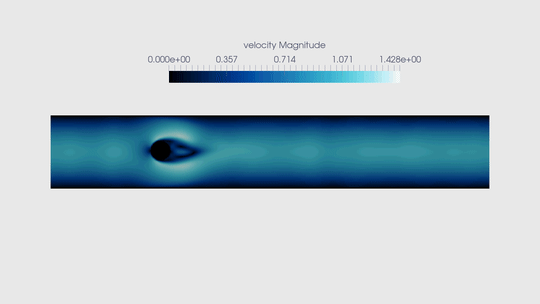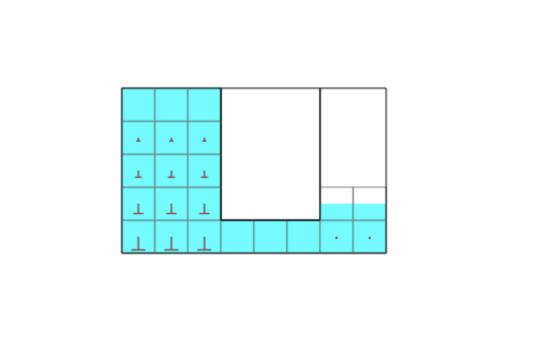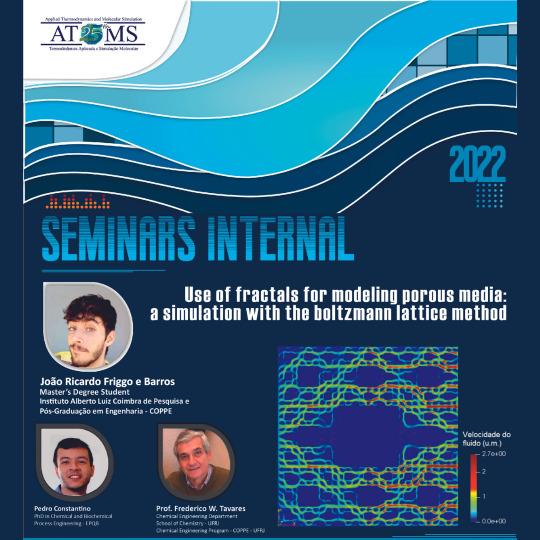#lattice boltzmann method
Explore tagged Tumblr posts
Text
youtube
This video showcases my third attempt at generating a vortex street behind a NACA 4-digit airfoil. The airfoil is pitched to a nose-up orientation, corresponding to an Angle of Attack (AoA) of 30 degrees. For this iteration, I have improved the rendering of particles by using sprites, making them visually more smooth.
#gas dynamics#aerodynamics#computational fluid dynamics#CFD#lattice boltzmann method#fluid simulation#particle simulation#vortices#vorticity#wind tunnel#airfoil#Youtube
1 note
·
View note
Text

Investigation of Delta Wing Time Dependent Flow Characteristics with Lattice-Boltzmann Method
12 notes
·
View notes
Text
okay so Lattice Boltzmann method for fluid dynamics subdivides space into a discrete grid as I would have assumed, but it also subdivides velocities into discrete directions, typically choosing nine for a 2D simulation (stationary + eight directions):

so there are nine numbers in each cell (?) representing the particles in that cell with each direction, then each (small) timestep the velocities advect (particles move) to the adjacent cells, then there is some resolution of collisions, something something boundary conditions, and then a decay towards equilibrium.
with suitable application of calculus far beyond me it is apparently possible to prove this is a suitable approximation of navier-stokes in some circumstances and it can be used for simulation / making pretty pictures.
6 notes
·
View notes
Link
0 notes
Photo

Simulation of flow around cylinder with LBM (Lattice Boltzmann method) flow solver: https://fetchcfd.com/view-project/1196
#FetchCFD#cfd#lbm#lattice boltzmann method#computationalfluiddynamics#fluid mechanics#simulation#simulation platform#fluid dynamics#engineering#physics#palabos
2 notes
·
View notes
Photo

“Vorticity contours for asymmetric flapping of butterfly using Lattice Boltzmann method at Re = 1000. Downstroke is 3 times faster than upstroke.“
#transparent#cursing the gif tree#butterfly#CFD#flying#lattice Boltzmann method#simulation#fruits edit#youtube#SankhyaSutra Labs#vorticity
244 notes
·
View notes
Photo

New phase of modeling the viscous coupling effects of multiphase fluid flow
Many applications, including carbon dioxide storage and oil recovery, involve the simultaneous flow of two or more phases of matter (solid, liquid, gas, etc.) through porous materials. Pore-scale modeling of such multiphase flow has struggled to capture important phenomena referred to as viscous coupling effects. But now, a research team has developed a method that overcomes this limitation with potential applications to improve fuel technologies and carbon capture systems.
In a study published this month in Advances in Water Resources, researchers led by the International Institute for Carbon-Neutral Energy Research (WPI-I2CNER) at Kyushu University present a way to incorporate viscous coupling effects into pore-scale modeling of multiphase flow.
A common technique for studying such multiphase flows is pore network modeling (PNM), whereby simplified transport equations are solved for idealized pore geometries. PNM can be used to quickly estimate transport properties, but it neglects viscous coupling effects. An alternative approach is the lattice Boltzmann method (LBM), whereby equations governing fluid flow are solved for realistic pore geometries. Although the LBM can capture viscous coupling effects, it is extremely computationally inefficient.
Read more.
17 notes
·
View notes
Video
vimeo
12 Tanks Puzzle Simulation - Water from Resolved Analytics on Vimeo.
Which of the tanks will fill first? This animation from a CFD simulation utilizing the Lattice Boltzmann Method and the Volume of Fluid Method answers the question that has been on everyone's mind. At least for water. For ethylene glycol, see vimeo.com/242394823
For more details on these simulations, see our Quora post on this topic: quora.com/Which-of-the-12-tanks-in-this-image-will-fill-up-first-See-Question-Source-for-Image
Video Made by resolvedanalytics.com/cfd-consulting
8 notes
·
View notes
Text
youtube
This video showcases my second attempt at generating a vortex street behind a NACA 4-digit airfoil. The airfoil is pitched to a nose-up orientation, corresponding to an Angle of Attack (AoA) of 30 degrees. For this iteration, I have used a higher value of 'max camber' variable for a more pronounced vortex shedding simulation.
#gas dynamics#aerodynamics#computational fluid dynamics#fluid simulation#lattice boltzmann method#wind tunnel#vorticity#airfoil#particle simulation#Youtube
1 note
·
View note
Text
In summary, while a direct implementation of the Euler incompressible equations using a standard cellular automaton is difficult due to the continuous nature of the variables and the global incompressibility constraint, the Lattice Boltzmann Method (LBM) provides a powerful and effective way to simulate incompressible fluid flow on a discrete grid by operating on distribution functions and employing local collision and streaming rules that lead to the desired macroscopic behavior.
hmm! I was imagining a kind of Monte Carlo search approach to finding a viable solution and maybe that's what this is 🧐

finally trying to implement the dumb little fluid mechanics hacks I've been fruitlessly dreaming about since high school
86 notes
·
View notes
Photo

LBM simulation of flow around an obstacle: https://fetchcfd.com/view-project/1204
#fetchcfd#fluid mechanics#computational fluid dynamics#physics#engineering#simulation#simulation platform#palabos#fluid dynamics#cfd#lbm#lattice boltzmann method
1 note
·
View note
Photo

In our last internal AT🌐MS seminar, the Master's Degree Student João Ricardo Friggo e Barros presented the work: 'Use of fractals for modeling porous media: a simulation with the boltzmann lattice method'. 💬 Summary of the work: a simulation of a flow in a porous medium was perfomed with the software 'OpenLB', a package for the implementation of Lattice Boltzmann's methods. For that, the Cylinder2D laminar flow example was modified to resemble the geometry of the 'Sierpinski Carpet' fractal.
0 notes
Text
youtube
This video presents a frame capture of a Lattice Boltzmann simulation illustrating the formation of von Kármán vortex streets behind a cylindrical bluff body. OpenGL-based particle rendering is used to enhance the visual representation of the flow dynamics.
#gas dynamics#aerodynamics#computational fluid dynamics#lattice boltzmann method#von karman vortex street#vorticity#vortices#wind tunnel#particle simulation#Youtube
1 note
·
View note
Photo

The role of design optimization has been rapidly increasing and evolving in Computer-Aided Engineering & Design. Convolutional neural networks have been proven successful in learning geometry representations. The main contribution of our CNN-based CFD prediction is to achieve up to two to four orders of magnitude speedup compared to the traditional Lattice Boltzmann Method (LBM) for CFD analysis at a cost of low error rates.Learn Machine Learning for Shape Optimization
0 notes
Photo

Lattice Boltzmann Method is a powerful technique for computational modeling of a wide variety of complex fluid flow problems involving single and multiphase flows over complex geometries. The current work was of interest to our customers who need a tool to simulate flow over standing structures in a city.
0 notes